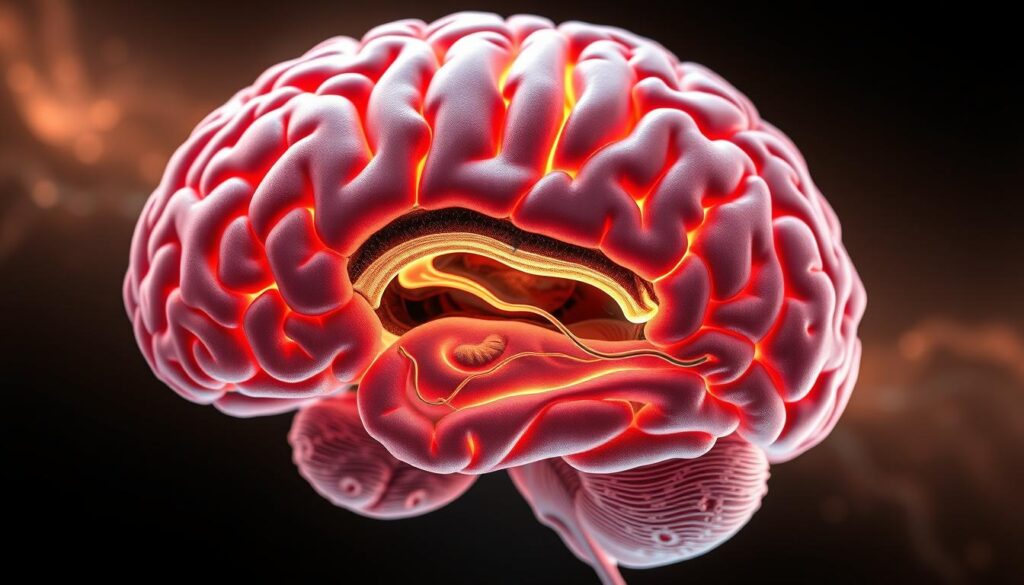The human brain is a complex and dynamic organ, and maintaining its health is crucial for overall well-being. Omega-3 fatty acids play a vital role in brain function and development, yet many people do not consume enough of these essential nutrients.
Research has shown that omega-3 deficiency can lead to impaired cognitive function, mood disorders, and even depression. In contrast, adequate intake of these nutrients has been linked to improved brain health and a reduced risk of neurological disorders.
The three primary types of omega-3s – EPA, DHA, and ALA – each contribute differently to brain health. DHA, in particular, is critical for brain structure and function. As we explore the science behind omega-3s and brain health, we’ll examine the recommended intake levels, food sources, and practical ways to incorporate these brain-boosting nutrients into your daily routine.
Key Takeaways
- Omega-3 fatty acids are essential for brain health and cognitive function.
- Modern diets often lack sufficient omega-3s, with most people consuming only 100-200 mg daily.
- DHA is particularly critical for brain structure and function.
- Adequate omega-3 intake is linked to improved brain health and reduced risk of neurological disorders.
- Increasing omega-3 consumption can be achieved through dietary changes and supplements.
The Science Behind Omega-3 Fatty Acids and Brain Function
Understanding the science behind omega-3 fatty acids and their impact on brain function is essential for appreciating their importance in overall health. Omega-3 fatty acids are known to play a significant role in maintaining optimal brain health, and research has elucidated several key mechanisms through which they exert their effects.
Types of Omega-3s: EPA, DHA, and ALA
There are three primary types of omega-3 fatty acids: Eicosapentaenoic acid (EPA), Docosahexaenoic acid (DHA), and Alpha-linolenic acid (ALA). DHA is particularly important for brain health as it is a major structural component of the brain’s cell membranes. While EPA and ALA have their own unique benefits, DHA’s role in brain function and development is especially noteworthy.
| Type of Omega-3 | Primary Sources | Key Benefits for Brain Health |
|---|---|---|
| DHA | Fatty fish, seafood, algal oil | Structural component of brain cell membranes, supports brain development and function |
| EPA | Fatty fish, seafood | Anti-inflammatory effects, supports overall brain health |
| ALA | Plant-based sources (flaxseed, chia seeds) | Converted to EPA and DHA in the body, supports heart health and indirectly benefits brain health |
How Omega-3s Get Incorporated Into Brain Cells
Omega-3 fatty acids, particularly DHA, are incorporated into brain cells through a complex process. They cross the blood-brain barrier via specialized transport systems that prioritize DHA delivery to neural tissues. Once in the brain, these fatty acids become part of the phospholipids that form the structural foundation of neuronal cell membranes. This incorporation increases membrane fluidity, optimizing receptor function and neurotransmitter release.
The integration of DHA into brain cell membranes is crucial for maintaining healthy brain function. It creates microdomains that facilitate protein-protein interactions essential for synaptic signaling and neuronal communication. This process is vital not only during brain development but also throughout life as part of ongoing cellular maintenance and repair.
What Daily Omega-3 Intake Does for Your Brain
Omega-3 fatty acids play a crucial role in maintaining optimal brain health through various mechanisms. The incorporation of these essential fatty acids into daily diet can lead to significant improvements in cognitive function and overall brain well-being.
Cellular Membrane Fluidity and Neurotransmitter Function
The omega-3 fatty acids, particularly DHA, are known to influence brain cell membrane fluidity, which is crucial for proper neurotransmitter function. A diet rich in omega-3s helps maintain the fluidity of cellular membranes, ensuring efficient transmission of neural signals. This is essential for maintaining optimal cognitive function and overall brain health.

Anti-inflammatory Effects in Neural Tissue
The anti-inflammatory effects of omega-3 fatty acids are vital for maintaining healthy neural tissues. EPA and DHA have been shown to produce specialized pro-resolving mediators (SPMs) that actively resolve inflammation in neural tissues. This anti-inflammatory action helps mitigate chronic neuroinflammation, which is implicated in numerous brain disorders.
- EPA and DHA compete with pro-inflammatory omega-6 fatty acids for the same enzymatic pathways, reducing the production of inflammatory eicosanoids.
- The anti-inflammatory effects of omega-3s help protect delicate neural tissues from oxidative damage and support optimal brain function during aging.
- Research has demonstrated that these anti-inflammatory properties may contribute to the beneficial effects of omega-3s in conditions like depression, where inflammation plays a significant role.
| Omega-3 Effects | Description | Benefit |
|---|---|---|
| Cellular Membrane Fluidity | Influences brain cell membrane fluidity | Improves neurotransmitter function |
| Anti-inflammatory Effects | Produces SPMs, reduces inflammation | Protects neural tissues, supports brain function |
| Competition with Omega-6 | Competes with pro-inflammatory omega-6 fatty acids | Reduces production of inflammatory eicosanoids |
The Omega-6/Omega-3 Ratio: Finding the Right Balance
Maintaining an optimal omega-6/omega-3 ratio is essential for overall brain health and function. The balance between these two types of fatty acids plays a critical role in supporting various bodily functions, including inflammation regulation and brain cell membrane integrity.
Disruption by Modern Diets
Modern diets often disrupt this delicate balance by consuming high amounts of omega-6 fatty acids found in processed foods and vegetable oils, leading to an omega-6/omega-3 ratio that is far from optimal. The typical Western diet has an omega-6/omega-3 ratio of around 20:1, significantly higher than the ideal range.
Optimal Ratio for Brain Health
Research indicates that a dietary omega-6/omega-3 ratio of approximately 1:1 to 4:1 is optimal for brain function and neurological health. At this ratio, the conversion of plant-based ALA to the more bioactive EPA and DHA is maximized. Studies have shown that balancing this ratio helps maintain proper neuronal membrane fluidity, essential for optimal neurotransmitter function and signaling. Lower omega-6/omega-3 ratios are associated with reduced neuroinflammation and oxidative stress in brain tissues.
Achieving this optimal ratio typically requires both increasing omega-3 intake through fatty fish or supplements and reducing sources of concentrated omega-6 fatty acids in the diet. By making these adjustments, individuals can support their brain health and potentially reduce the risk of neurological disorders.
Omega-3s and Brain Development Throughout Life
From fetal development to old age, omega-3s are essential for maintaining optimal brain function and health. The significance of these fatty acids in brain development and maintenance is a continuous process that affects individuals across their lifespan.
Prenatal and Early Childhood Brain Development
During prenatal development and early childhood, omega-3 fatty acids, particularly DHA, play a critical role in brain formation and maturation. Research has shown that adequate maternal intake of DHA during pregnancy is associated with improved cognitive and visual development in infants. In early childhood, continued consumption of omega-3s supports the rapid growth and development of brain cells and neural connections.
The importance of omega-3s in this developmental stage cannot be overstated, as it lays the foundation for future cognitive and neurological health. Ensuring adequate intake through diet or supplementation is crucial for expecting mothers and young children.
Adult Brain Maintenance and Aging
In adulthood, omega-3 fatty acids continue to support brain function by maintaining neuronal membrane integrity and facilitating efficient neurotransmission. Studies have demonstrated that adults with higher levels of omega-3s exhibit better cognitive performance, particularly in areas such as memory, attention, and executive function.
As individuals age, omega-3s help mitigate the natural increase in neuroinflammation and oxidative stress that can damage brain cells. Longitudinal studies suggest that maintaining adequate omega-3 intake throughout adulthood may slow age-related brain volume loss, particularly in regions associated with memory. The neuroprotective effects of omega-3s are most beneficial when maintained consistently throughout life, rather than initiated only after cognitive decline has begun.

How Omega-3s May Help Combat Depression and Anxiety
The link between omega-3 fatty acids and mental health has garnered significant attention in recent years, particularly regarding their potential to alleviate symptoms of depression and anxiety. Depression is one of the most common mental disorders worldwide, characterized by persistent sadness, lethargy, and a diminished interest in activities. Anxiety disorders, marked by feelings of fear, panic, and restlessness, are another prevalent mental health issue.
Mechanisms Behind Mood Regulation
Omega-3 fatty acids, particularly EPA and DHA, play a crucial role in brain function and may influence mood regulation through several mechanisms. They are incorporated into brain cells, affecting cellular membrane fluidity and neurotransmitter function. This incorporation can enhance the transmission of signals between neurons, potentially improving mood and reducing symptoms of depression.
EPA and DHA have been shown to have anti-inflammatory effects, which may also contribute to their potential antidepressant effects, as inflammation is believed to play a role in the pathophysiology of depression.
Research on Omega-3 Supplementation for Mental Health
Numerous studies have investigated the efficacy of omega-3 supplementation in managing depression and anxiety. A meta-analysis of 13 randomized controlled trials found that omega-3 supplementation significantly reduced symptoms of depression compared to placebo treatments.
| Study Findings | Dosage | Duration |
|---|---|---|
| Significant reduction in depression symptoms | 1-2 grams EPA & DHA combined | 4-8 weeks |
| Greater efficacy with higher EPA content | At least 60% EPA | Varies |
| Potential benefits for other mental health conditions | Varies | Varies |
Research indicates that supplements with higher EPA content (typically at least 60% of total omega-3 content) show greater efficacy for depression than those with primarily DHA. The therapeutic effects of omega-3 supplementation typically emerge after 4-8 weeks of consistent use, similar to the timeline seen with conventional antidepressants.
Omega-3s for Cognitive Function and Memory
The relationship between omega-3 fatty acids and cognitive function is a subject of increasing interest. As research continues to uncover the mechanisms by which omega-3s influence brain function, it becomes clear that these essential fatty acids play a vital role in maintaining cognitive health throughout life.
Omega-3s, particularly DHA, have been shown to be crucial for brain function and cognitive processes. Studies have indicated that these fatty acids are involved in the structure and function of brain cells, influencing learning and memory.
Effects on Learning and Attention
Research has demonstrated that omega-3 supplementation can have a positive impact on learning and attention. A study investigating the effects of omega-3 supplementation on cognitive function found that DHA supplementation improved memory and learning tests in older adults.
As stated by a researcher, “The findings suggest that omega-3 fatty acids, particularly DHA, may be beneficial for cognitive function in older adults.”
“The findings suggest that omega-3 fatty acids, particularly DHA, may be beneficial for cognitive function in older adults.”

Protection Against Age-Related Cognitive Decline
Research indicates that omega-3s may help protect against age-related cognitive decline. Studies have shown that higher blood levels of omega-3 fatty acids, particularly DHA, are associated with slower rates of cognitive decline in older adults.
Some key findings from research include:
- Omega-3 supplementation may improve memory and cognitive function in older adults with mild cognitive impairment.
- The neuroprotective effects of omega-3s may reduce the accumulation of beta-amyloid plaques and tau tangles, hallmarks of Alzheimer’s disease.
- Omega-3s help maintain white matter integrity and cerebral blood flow, which decline naturally with age and contribute to cognitive changes.
These findings highlight the importance of omega-3s in maintaining brain function and cognitive health as we age.
Recommended Daily Intake of Omega-3 for Optimal Brain Health
Understanding the recommended daily intake of omega-3 fatty acids is crucial for maintaining optimal brain health. Omega-3 fatty acids, particularly EPA and DHA, play a vital role in brain function and development.
The recommended daily intake varies across different age groups and health conditions. A well-balanced intake is essential to support brain health throughout life.
General Guidelines for Different Age Groups
For adults, a daily intake of 250-500 mg of combined EPA and DHA is generally recommended. This can be achieved through a combination of dietary sources and supplements. For children, the requirements vary based on age and health status.
Children with neurodevelopmental conditions may benefit from higher intakes, typically 500-1,000 mg of EPA+DHA daily. It’s essential to consult healthcare professionals to determine the optimal intake for children.
Special Considerations for Pregnant Women and Children
Pregnant women have increased omega-3 requirements to support fetal brain development. The International Society for the Study of Fatty Acids and Lipids recommends a daily intake of 300 mg of DHA during pregnancy and lactation.
However, the average intake of DHA in pregnant or nursing women is only 60-80 mg/day, which is about 25% of the recommended daily intake. Women carrying multiple fetuses have increased omega-3 requirements. Breastfeeding women should maintain a higher omega-3 intake to ensure adequate levels in breast milk.
When it comes to fish consumption during pregnancy, women should choose low-mercury options like salmon, sardines, and trout to maximize omega-3 benefits while minimizing potential contaminant exposure.
Best Food Sources of Brain-Boosting Omega-3s
A well-balanced diet that includes omega-3 rich foods can significantly contribute to better brain health. Omega-3 fatty acids are essential for brain function, and consuming the right foods can provide an adequate supply.
Marine Sources: Fatty Fish and Seafood
Fatty fish and seafood are among the richest sources of omega-3 fatty acids, particularly EPA and DHA. These marine sources are crucial for brain health due to their high concentration of these essential fatty acids.
- Fatty fish like salmon, sardines, and mackerel are excellent sources of EPA and DHA.
- Seafood such as oysters, caviar, and krill also contain significant amounts of omega-3s.

Plant-Based Sources and Their Conversion Efficiency
While marine sources are rich in EPA and DHA, plant-based sources contain alpha-linolenic acid (ALA), a precursor to these omega-3s. However, the conversion of ALA to EPA and DHA is limited in humans.
- Flaxseeds and chia seeds are among the richest plant sources of ALA, containing approximately 2.5 grams and 5 grams per tablespoon, respectively.
- Walnuts provide about 2.5 grams of ALA per ounce (about 14 halves), making them one of the most omega-3-rich nuts.
- The conversion of ALA to EPA and DHA is influenced by several factors, including diet composition, gender, age, and genetic factors.
In conclusion, incorporating both marine and plant-based sources of omega-3s into your diet can support brain health. While marine sources provide direct EPA and DHA, plant-based sources offer ALA, which can be converted to these essential fatty acids, albeit with limited efficiency.
Omega-3 Supplements: Types, Quality, and What to Look For
With numerous omega-3 supplements on the market, it’s essential to evaluate their differences to maximize their brain health benefits. Omega-3 supplements come in various forms, each with its own set of characteristics that can impact their effectiveness and safety.
Fish Oil vs. Krill Oil vs. Algal Oil
The primary sources of omega-3 supplements are fish oil, krill oil, and algal oil. Fish oil is derived from fatty fish and is rich in EPA and DHA. Krill oil, sourced from krill, also contains EPA and DHA, and is often touted for its superior absorption due to its phospholipid structure. Algal oil, derived from algae, is a vegan alternative that directly sources EPA and DHA, bypassing the need for fish or krill.
| Source | EPA & DHA Content | Absorption Efficiency |
|---|---|---|
| Fish Oil | High | Good |
| Krill Oil | Moderate | Excellent |
| Algal Oil | High | Good |
Ensuring Supplement Quality and Purity
However, as always, you should inform your physician before starting fish oil supplements, especially if you are currently taking blood-thinning medications or have an upcoming surgery. Ensuring the quality and purity of omega-3 supplements is critical. Key factors include third-party testing, processing methods, freshness, and the inclusion of antioxidants.
- Third-party testing verifies supplement purity, potency, and freedom from contaminants.
- Processing methods like molecular distillation and supercritical extraction produce pure omega-3 supplements.
- Freshness is crucial as omega-3 oils are prone to oxidation, which can reduce potency and create harmful compounds.
Quality supplements typically include antioxidants like vitamin E to prevent oxidation. Transparent labeling that clearly states the specific amounts of EPA and DHA is also essential for accurately assessing the active ingredient content.
Creating a Daily Omega-3 Routine for Brain Health
To reap the benefits of omega-3 for your brain, creating a consistent daily routine is essential. This involves not just taking supplements or consuming omega-3 rich foods, but doing so in a manner that maximizes absorption and effectiveness.
Meal Planning Strategies
Incorporating omega-3 rich foods into your diet can be made easier with meal planning. Fatty fish like salmon and sardines are excellent sources. You can also include plant-based sources like flaxseeds and chia seeds in your meals.
For those taking omega-3 supplements, taking them with a meal that contains some fat can enhance absorption. This is because omega-3 fatty acids are fat-soluble nutrients.
| Food | Omega-3 Content | Meal Ideas |
|---|---|---|
| Salmon | 1.8 grams per 3 oz serving | Grilled salmon with avocado |
| Sardines | 1.3 grams per 3 oz serving | Sardine salad with olive oil |
| Flaxseeds | 6.4 grams per tablespoon | Add to oatmeal or smoothies |
Timing and Consistency Tips
For optimal results, it’s crucial to maintain a consistent daily routine. Take omega-3 supplements at the same time every day, such as with breakfast or dinner.
- Divide your daily dose between morning and evening meals if you experience digestive discomfort from fish oil supplements.
- Store omega-3 supplements in cool, dark places to prevent oxidation.
- Set reminders or pair supplement taking with an existing daily habit to ensure consistency.
- Be patient, as the beneficial effects of omega-3s on brain function develop over weeks to months.
By following these tips and maintaining a consistent daily routine, you can maximize the benefits of omega-3 for your brain health.
Conclusion: Making Omega-3s Part of Your Brain Health Strategy
By understanding the role of omega-3s in brain health, individuals can make informed decisions about their diet and supplement routine.
Omega-3 fatty acids represent one of the most well-researched nutritional approaches to supporting brain function throughout the lifespan.
Incorporating these essential nutrients through both dietary sources and supplements provides a foundation for optimal brain health and protection against neurological and psychiatric conditions.
The benefits of omega-3s extend beyond the brain to include cardiovascular health, reduced inflammation, and support for numerous body systems, creating a comprehensive approach to wellness.
To get the most out of omega-3s, it’s essential to incorporate them into an integrated strategy that includes other brain-supporting factors like physical activity, cognitive stimulation, quality sleep, and stress management.
## FAQ
### Q: What are the main types of omega-3 fatty acids beneficial for brain health?
A: The main types are eicosapentaenoic acid (EPA), docosahexaenoic acid (DHA), and alpha-linolenic acid (ALA). EPA and DHA are found primarily in fatty fish and seafood, while ALA is found in plant-based sources like flaxseeds and walnuts.
### Q: How do omega-3 fatty acids support brain function?
A: Omega-3s, particularly DHA, are incorporated into brain cell membranes, enhancing their fluidity and supporting neurotransmitter function. They also exert anti-inflammatory effects that may protect against neural damage.
### Q: What is the ideal omega-6 to omega-3 ratio for brain health?
A: While the ideal ratio is debated, a balanced ratio is considered to be around 1:1 to 4:1 (omega-6:omega-3). Modern diets often skew this ratio due to high consumption of omega-6 rich foods, potentially disrupting brain health.
### Q: Can omega-3 supplements help with depression and anxiety?
A: Research suggests that omega-3 supplements, particularly those with a high EPA content, may help alleviate symptoms of depression and anxiety in some individuals. However, results vary, and more research is needed.
### Q: How much omega-3 should I consume daily for optimal brain health?
A: General guidelines recommend consuming about 250-500 mg of combined EPA and DHA per day. Pregnant women and children may require different amounts, and it’s best to consult a healthcare professional for specific recommendations.
### Q: Are there any plant-based sources of omega-3s that are beneficial for brain health?
A: Yes, alpha-linolenic acid (ALA) is a plant-based omega-3 found in sources like flaxseeds, chia seeds, and walnuts. While ALA is beneficial, its conversion to EPA and DHA in the body is limited, so it’s essential to consume a variety of sources.
### Q: What are the differences between fish oil, krill oil, and algal oil supplements?
A: Fish oil is derived from fatty fish, krill oil from krill, and algal oil from algae. Each has different EPA and DHA levels and may have varying levels of other nutrients like vitamin D. Algal oil is a vegan alternative.
### Q: How can I ensure the quality and purity of omega-3 supplements?
A: Look for supplements that are third-party tested, have clear labeling of EPA and DHA content, and are derived from sustainable sources. Checking for certifications like IFOS or NSF International can also help ensure quality.





